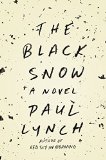Summary | Excerpt | Reading Guide | Reviews | Beyond the book | Read-Alikes | Genres & Themes | Author Bio

One winter night in 1973, Jim Kennoway returns in secret to his summer home on Fox Island, in Maine's Penobscot Bay. He has been an army lieutenant; a naturalist with a book about the avifauna of Oceania to his credit; an ornithologist and skinner of birds for New York City's American Museum of Natural History; and an unreliable husband and father. Now in his early seventies, having lost a leg to disease, Jim is fast turning into an alcoholic recluse, like some later-life Ernest Hemingway figure: "He'd become a mothballed, dried-up skin himself. A shriveled specimen preserved by alcohol—gin, in his case."
Life will not allow him to slip away into drunken oblivion just yet, though, for in a stunning clash of worlds, he will soon play host to a young woman from the Solomon Islands (see 'Beyond the Book'). Jim spent some time in Guadalcanal and its sister islands when he served in the military. It was during this time that he got to know Tosca Baketi, a native who served as Jim's bird-collecting assistant. Jim sends most of his inheritance from a hated grandfather to this assistant, and Cadillac, Tosca's daughter, will use that money to come study medicine at Yale.
The novel's rich historical tapestry is constructed through many layers of flashbacks, from Jim's carefree island childhood in 1913 to his war service in 1943. Greenway has a masterful grasp of the six decades that make up her tale, such that she shifts seamlessly between time periods without ever losing the reader's attention. Some flashbacks are delineated by dated chapter headings, while others are set apart simply through the use of italic script.
Likewise, Greenway moves effortlessly between her characters' points-of-view, sometimes within the same chapter. In one remarkable section, she intersperses Jim's and Cadillac's perspectives, switching between them every one or two pages to give both their present musings at the Maine waterfront and their memories of life on the Solomon Islands. Even when no words are spoken, Greenway employs a free indirect style that ensures the narrator captures the exact voice of each character. Thus a sentence like "Wintertime, Jesus Christ, he lived like a bear" echoes Jim's own speech patterns, but still maintains the distance of third-person omniscient narration.
Jim remains a prickly and elusive character, but the picture of him grows clearer through other characters' viewpoints and by way of archival records. Readers earn differing glimpses of the man through his museum colleagues: Michael, who is tasked with writing a retrospective profile of Jim's career, and curator Laina, who regrets never taking a chance on an affair with Jim, even though he was 35 years her senior. Meanwhile, Jim's catalogued specimens, with their exotic names and vibrant feathers, show one aspect of his professional life, but the court-martial documentation Laina finds in Jim's records gives an alternative – and rather chilling – look at the legacy of this obsessive collector.
The Bird Skinner is enlivened by its surprising mixture of cultures and languages, with Latin species names sharing space with Cadillac's songs in Islands pidgin. Yet Greenway avoids easy conclusions about culture clash, instead making a nuanced case for how unexpected combinations of people and customs can coexist. In a similar way, the novel pivots on dualities that are not as exclusive as they might at first seem. Past and present are not opposites but interdependent; the past persists in the frequent flashbacks and in Jim's sense of being haunted by his wartime actions and his wife's untimely death: "The last thing he needs is the past and its ghosts rising up, unbidden," but might Cadillac be "a ghost from his past sent to free him?"
Wildness versus civilization is another dichotomy that loses its strict edges as the novel progresses. Conventional storyline expectations might lead Cadillac to be the novel's emblem of savagery, but in fact her behavior is often more predictable and pacific than, for instance, Jim's. As Jim reads in a traveler's memoir, "civilization has also its perils," and this Maine island setting is "Both wild and workaday, which suits Jim somehow." The naturalist's work is a way of experiencing but also taming the wild world, Jim recognizes: "Birding…offered him both a way to engage with the world and a means to escape it." Greenway's vivid descriptions of birds and the skinning process – turning animate creatures into stunning but lifeless museum pieces – will intrigue those with even a passing interest in wildlife.
Like birds themselves, islands are a chief metaphor throughout the novel. Jim is even writing a monograph about the flora and fauna of the real-life "Treasure Island," and Robert Louis Stevenson's classic provides the epigraphs heading each section of the novel. Nearly all the book's places of reference (including, arguably, New York City) are islands, but these potential symbols of isolation only call attention to the novel's many unanticipated interconnections. Islands can be places of danger and exile, but also sites of great discovery and reward.
Greenway drew inspiration from real life: the character of Jim was based in part on her grandfather, ornithologist J. Greenway Jr., whose articles are cited in the novel's endnotes. Readers of The Bird Skinner may be left, as Jim says of his friendship with Tosca, "slightly dazed by how all the pieces fit together." But fit together they do, in a sophisticated narrative that blends seemingly irreconcilable times, places, and people into one lush and troubling whole.
![]() This review was originally published in The BookBrowse Review in February 2014, and has been updated for the
November 2014 edition.
Click here to go to this issue.
This review was originally published in The BookBrowse Review in February 2014, and has been updated for the
November 2014 edition.
Click here to go to this issue.

If you liked The Bird Skinner, try these:

by Elizabeth Church
Published 2017
In the spirit of The Aviator's Wife and Loving Frank, this resonant debut spans the years from World War II through the Vietnam War to tell the story of a woman whose scientific ambition is caught up in her relationships with two very different men.

by Paul Lynch
Published 2015
The startling new novel from a brilliant young Irish novelist on the rise, who "has a sensational gift for a sentence" (Colum McCann).
Your guide toexceptional books
BookBrowse seeks out and recommends the best in contemporary fiction and nonfiction—books that not only engage and entertain but also deepen our understanding of ourselves and the world around us.